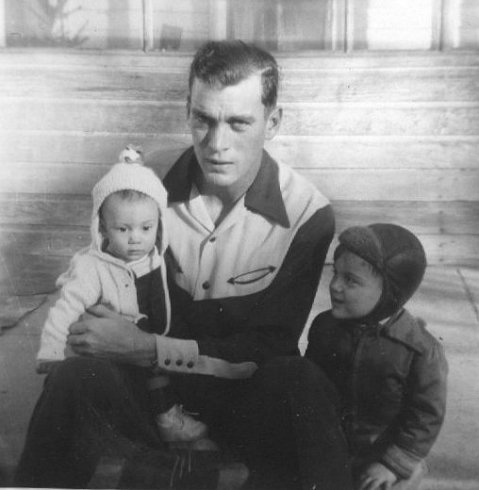All the time I was growing up, Dad raised watermelons, at first as a small addition of income and, in later years, to give away just because he wanted to. Raccoons were nearly always a problem, but for some reason, were worse some years than others. As I look back, I am about convinced that it was just one or possibly two raccoons that caused problems each year. If it had been all of them that were around, they would have eaten every melon that was raised.They had a unique way of eating a melon. (Dad, as I did later, always planted the long type melon. At that time, the round melon wasn't developed too well and the only place you saw them was in the stores where they had been shipped in from Texas or Oklahoma. They had very thick and tough rinds and were well suited for shipping. Anyway, the long melons such as the Rattlesnake, the Tom Watson and the Irish Grey were popular with local growers in Comanche County, Kansas.) The raccoon would somehow bore out a hole, almost perfectly round and approximately one and a half inches in diameter, and it was always almost perfectly centered lengthwise in the melon. They reached in with a forepaw and cleaned every shred of red "meat" from the melon and, so far as I could tell, none of the green from next to the rind. I never saw a case where they picked a green melon. I, nor anyone else I ever knew, ever had any idea of how they could tell that a melon was ripe. There didn't seem to be any way to keep raccoons out of a patch except an open fire and that only worked for a week or two.
After Alice and I were married, I planted and raised a great melon patch in what had been the old apple orchard south of the original Loren Ferrin homestead. My melons started to ripen and apparently more than one coon found them. They got every one just as soon as it ripened. I borrowed some lanterns and set six or eight of them in the patch. I lit them every evening and blew them out each morning. That stopped the coons for about a week and then they would sit right next to the lanterns and have light to eat by. Next I heard that they were afraid of open fire so I borrowed some road flares from the county road crew. The open flames kept them away for quite some time. We did manage to get some melons to eat ourselves during that time.
I guess the coons became accustomed to the open flames after a while because they came back to raid again. I wasn't going to give up easily so I fenced the patch with 2 feet high woven wire and charged the wire with an electric fence charger. Any animal is very sensitive to an electric shock but it didn't take the coons too many nights to figure out that they could jump over the fence.
I had one more trick to try: I put two outrigger wieres extended outward from the top of the fence and charged them. Again this stopped the coons for a time but when I went down one morning and found my patch almost totally destoryed, I gave up. They had tunneled under the fence and, much like a venetta, had almost totally destroyed the patch. I never planted watermelons again until three years ago here in Tucson.
Coyotes were sometimes a problem to Dad when he raised melons, but never like coons. Coyotes apparently picked a melon at random and carried it in their jaws to outside the patch where they could find a rock or a hard place to drop it on to break it. They were not like coons, they picked almost as many green ones as ripes ones. When a coyote found he'd picked a green one, he'd just go back and get another.
-- by Wendel Gene Ferrin, 01 February 1990.
Also see:
Leo Thornberry's Watermelon Patch
Practical Jokes & Backfired Actions: A few stories from Comanche County, Kansas - This page includes the story "Help Yourself - The Preacher and the Watermelon Patch".
Wendel Ferrin holds his 2nd son, Jerry, while his oldest son, Darrell, sits beside him.
Photo taken at the Ferrin farm, Comanche County, Kansas, December 1952.
